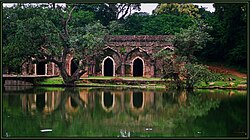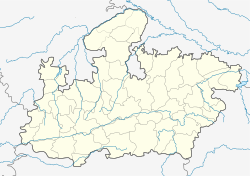Mandav
| Mandav | |
|---|---|
| city | |

Reva Lake at Mandav
|
|
| Location in Madhya Pradesh, India | |
| Coordinates: 22°20′11″N 75°24′56″E / 22.33639°N 75.41556°ECoordinates: 22°20′11″N 75°24′56″E / 22.33639°N 75.41556°E | |
| Country |
|
| State | Madhya Pradesh |
| District | Dhar |
| Population (2001) | |
| • Total | 8,545 |
| Languages | |
| • Official | Hindi |
| Time zone | IST (UTC+5:30) |
Mandav is a town and a nagar panchayat in Dhar district in the Indian state of Madhya Pradesh.
As of 2001[update] India census, Mandav had a population of 8545. Males constitute 51% of the population and females 49%. Mandav has an average literacy rate of 32%, lower than the national average of 59.5%: male literacy is 41%, and female literacy is 22%. In Mandav, 20% of the population is under 6 years of age.
Mandva is situated in the Vindhyanchal Range at 2000 feet above sea level. There is a deep ravine which separates it from the Malwa Plateau in Central India. Mandav is 100 km from Indore, the nearest airport.
The history of Mandav also known as Mandu is known from the Paramara period in the 8th century A.D. Later it was under Mughal rule. They called it Shadiabad, which means ‘The City of Joy’. The monuments are a mix of the Hindu and Afghan style of architecture
Mandu is a celebration in stone, of life and joy, of the love of the poet-prince Baz Bahadur for his beautiful consort, Rani Roopmati. The balladeers of Malwa still sing of the romance of these royal lovers, and high up on the crest of a hill, Roopmati's Pavilion still gazes down at Baz Bahadur's Palace, a magnificent expression of Afghan architecture.
Under Mughal rule, Mandu was a pleasure resort, its lakes and palaces the scenes of splendid and extravagant festivities. And the glory of Mandu lives on, in legends and songs, chronicled for posterity.
This article needs to merge with Mandu,_Madhya_Pradesh#Places_of_interest
There are number of monuments in Mandav. Among the most important are:
The Delhi Darwaja and Hoshang Shah tomb
The Delhi Darwaja is one of the twelve gateways to the city and is made up of reddish stone. The Hoshang Shahs tomb is a fine example of Afghan style architecture. It is said that four architects from Shah Jahan’s court visited Mandu and took inspiration for the Taj Mahal.
Hoshang Shah'S Tomb
The Jahaz Mahal and Hindola Mahal
The Jahaz Mahal, or the ship palace, resembles a ship sailing in water. There are two lakes, Kapur Talao and the Munja Talao, at the front of and behind the monument. The beautiful reflection of the palace can be seen in the tank waters. This was built in the period of Sultan Ghias-ud-din Khilji as a pleasure resort for his large harem.
...
Wikipedia


